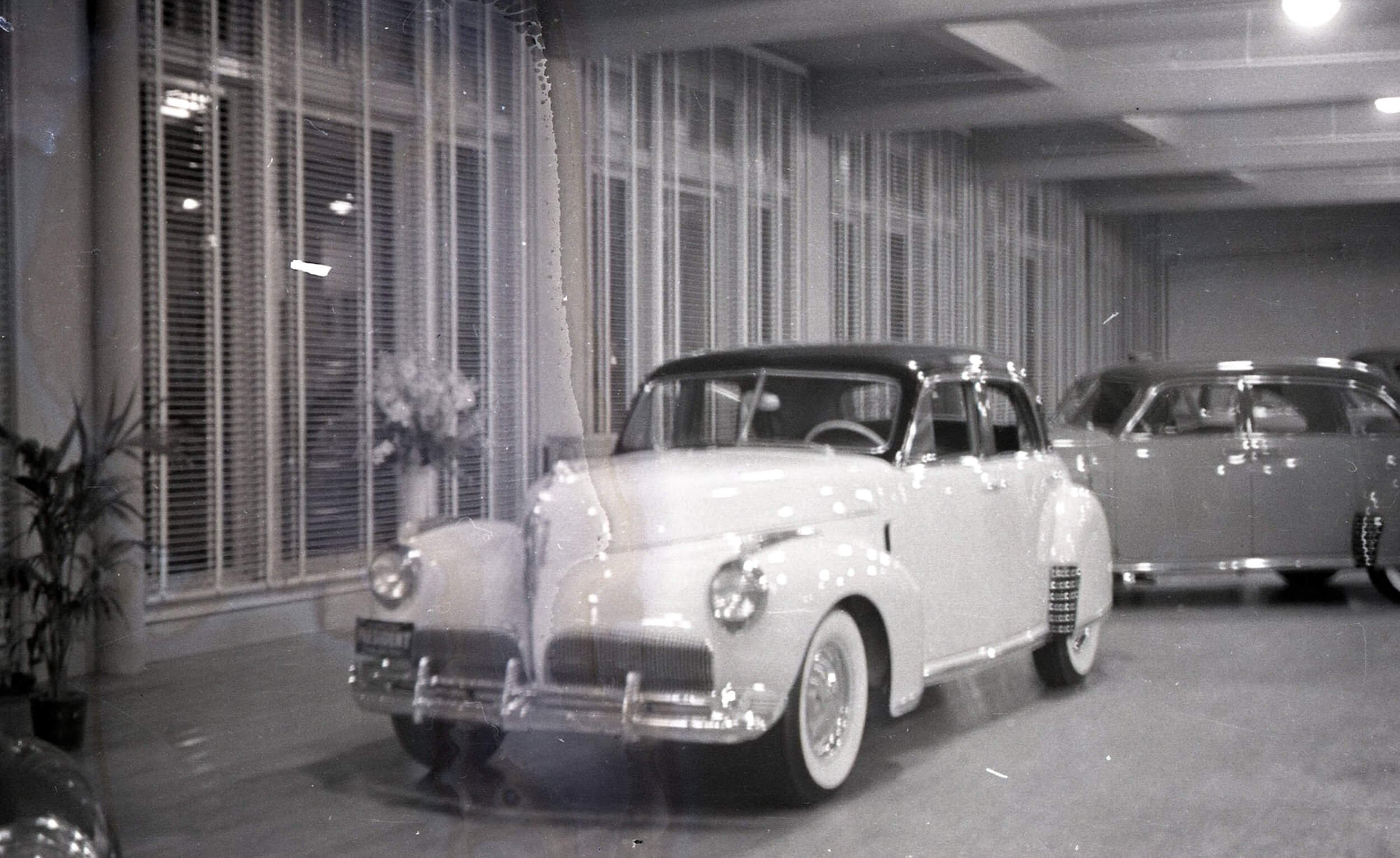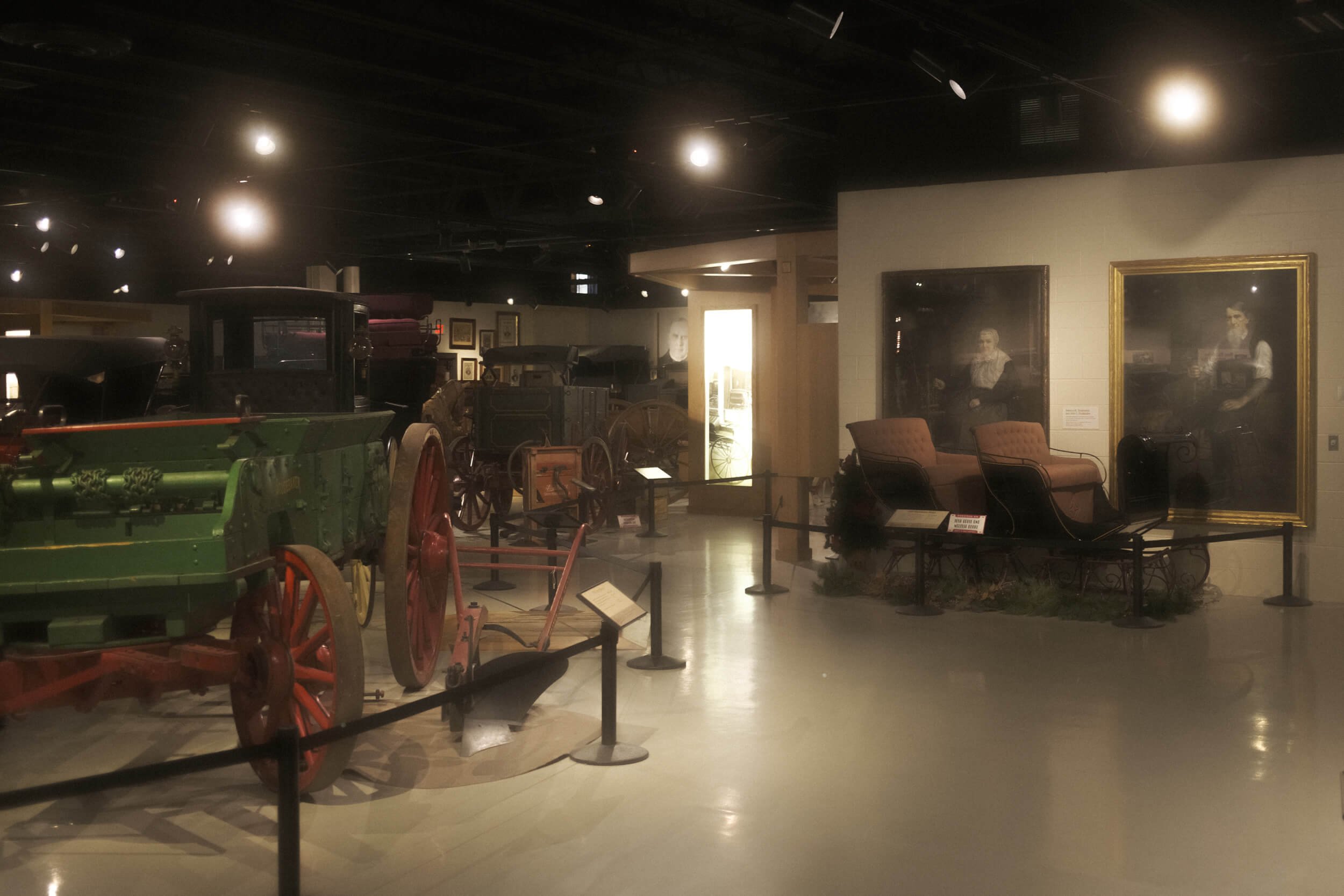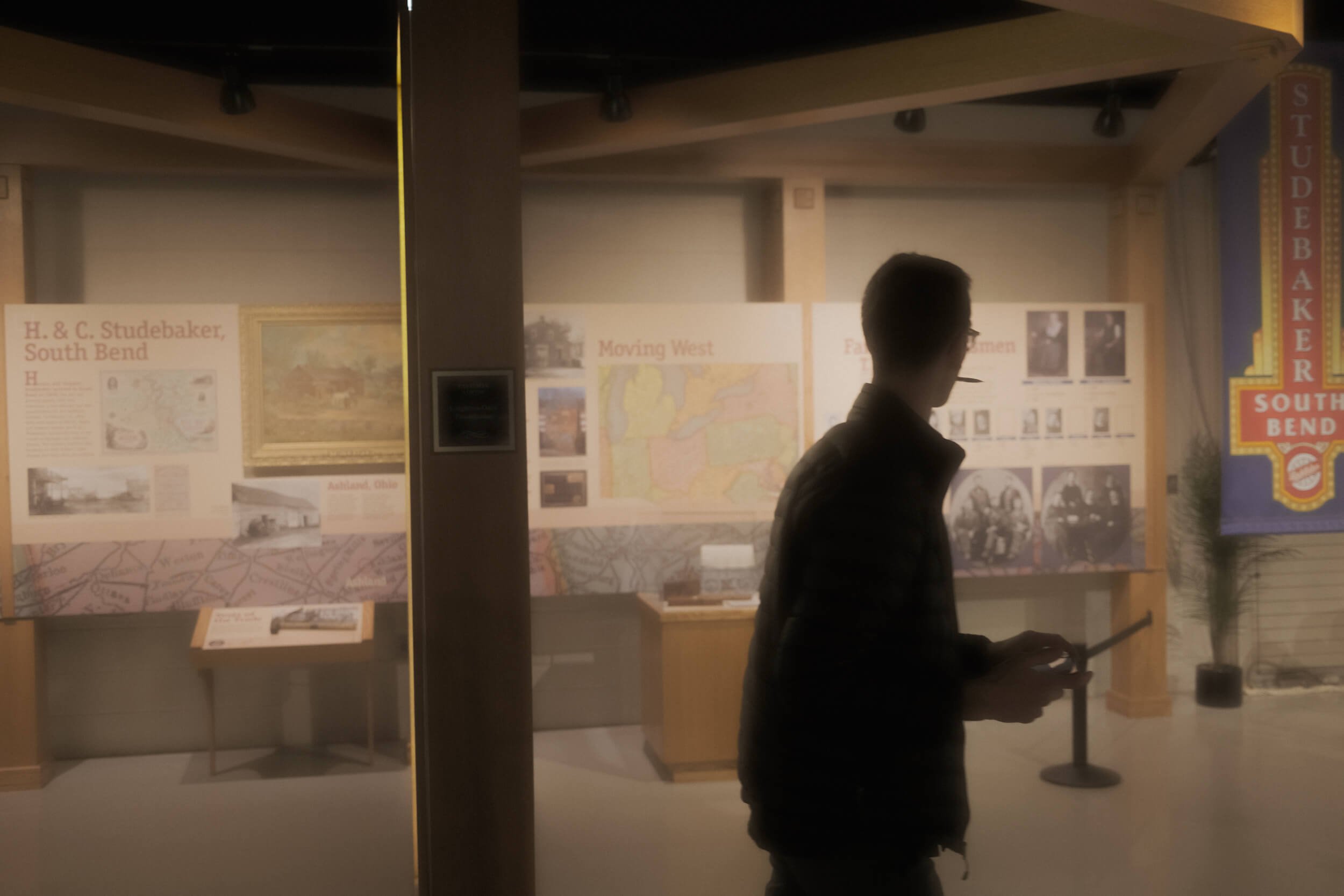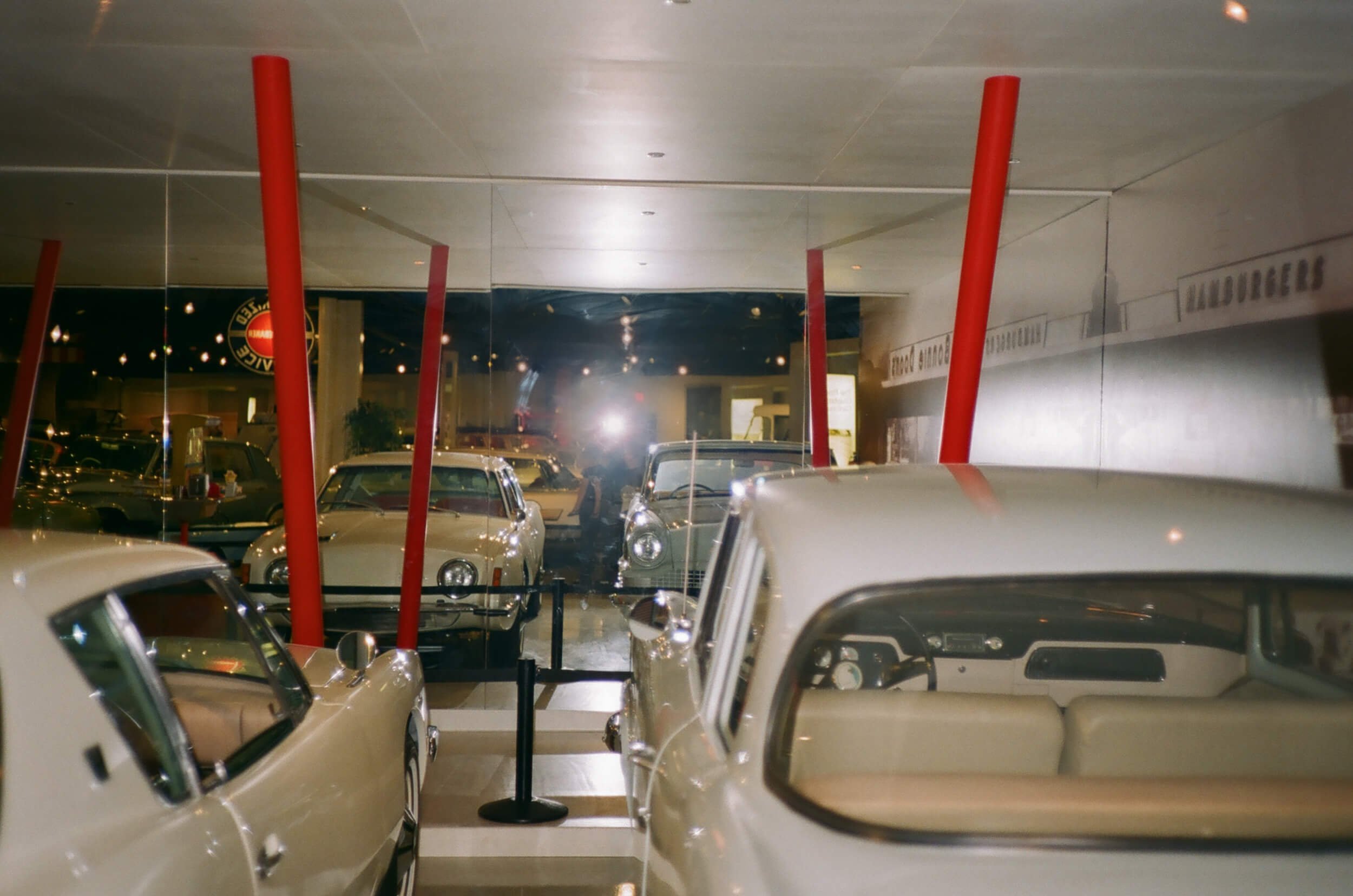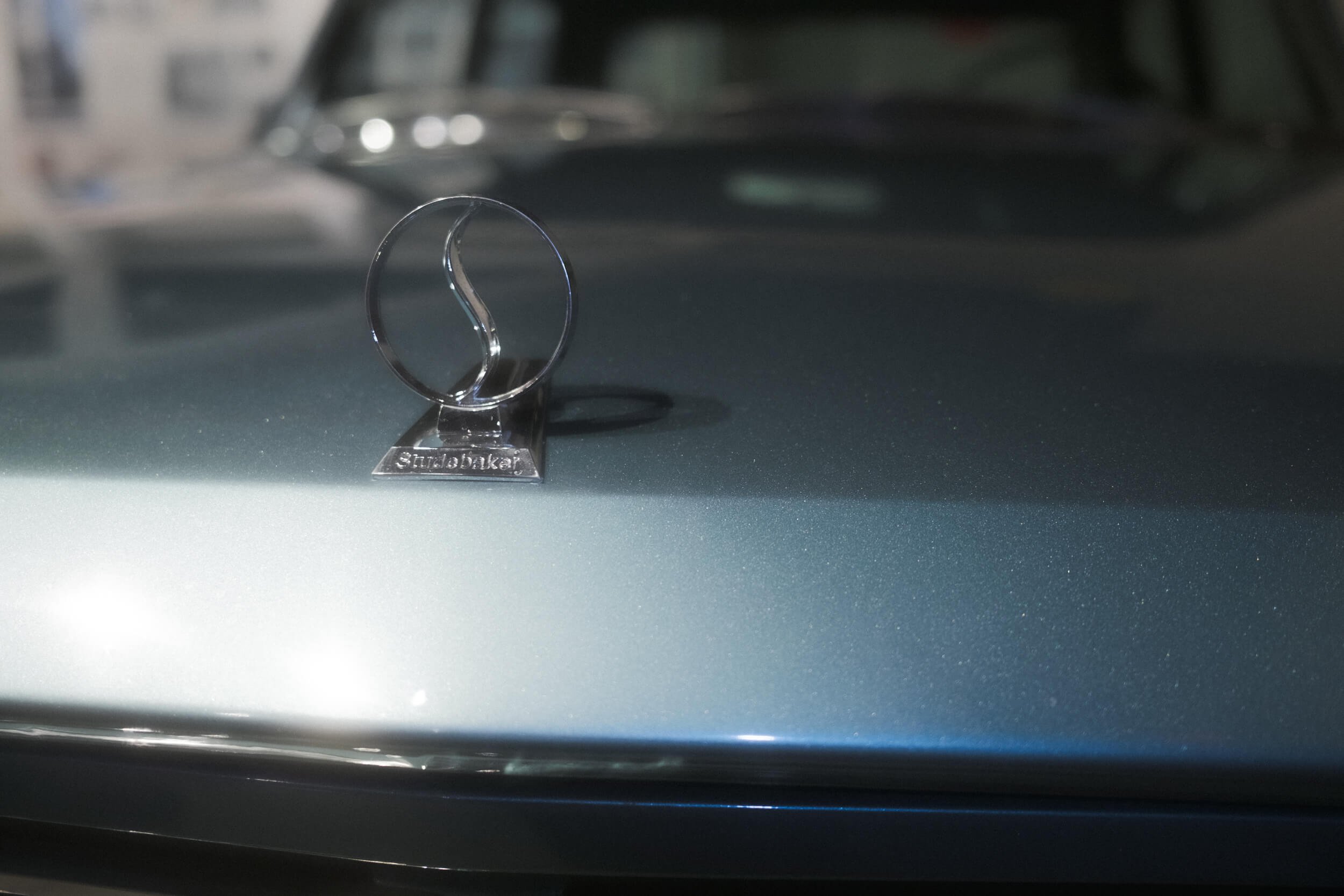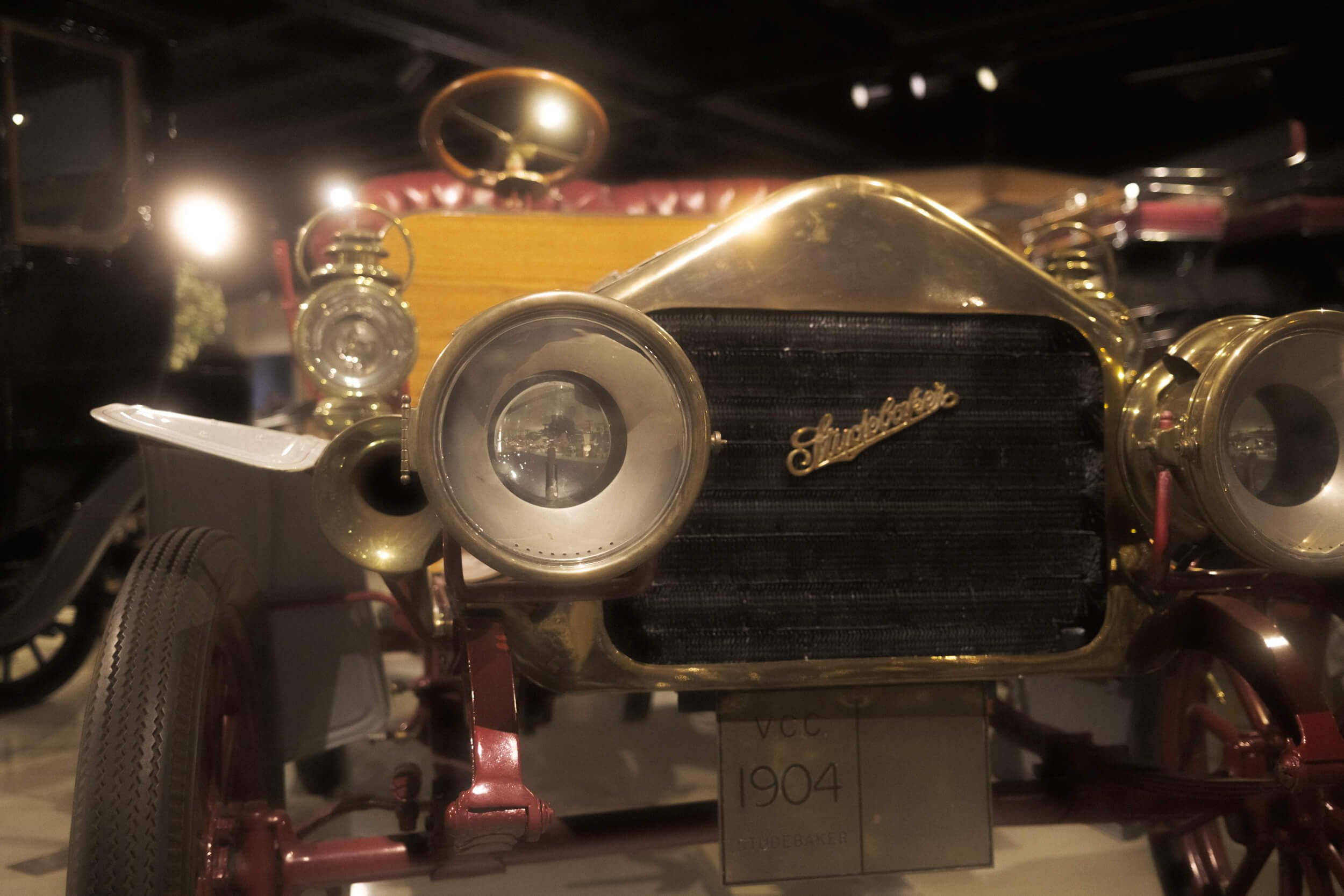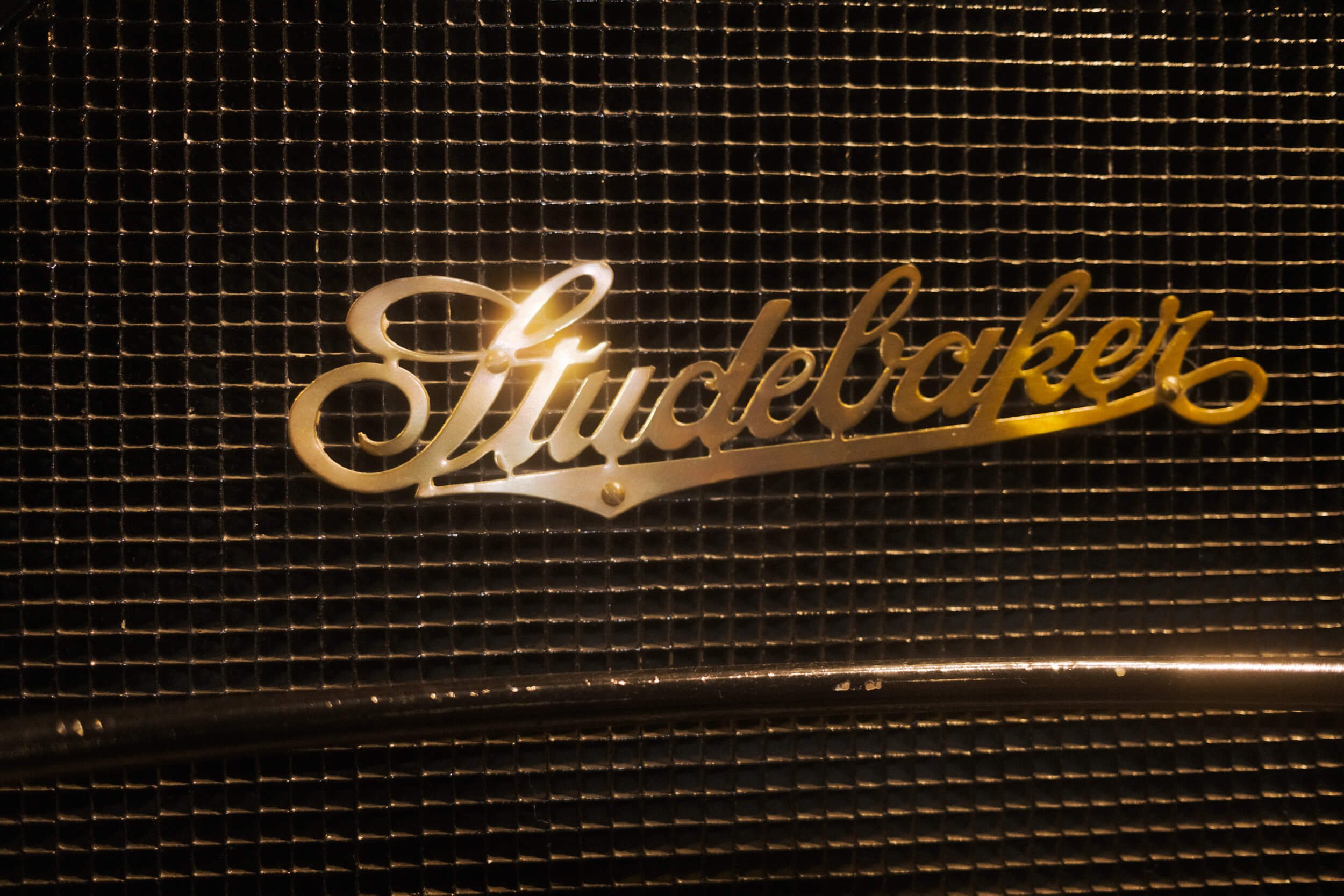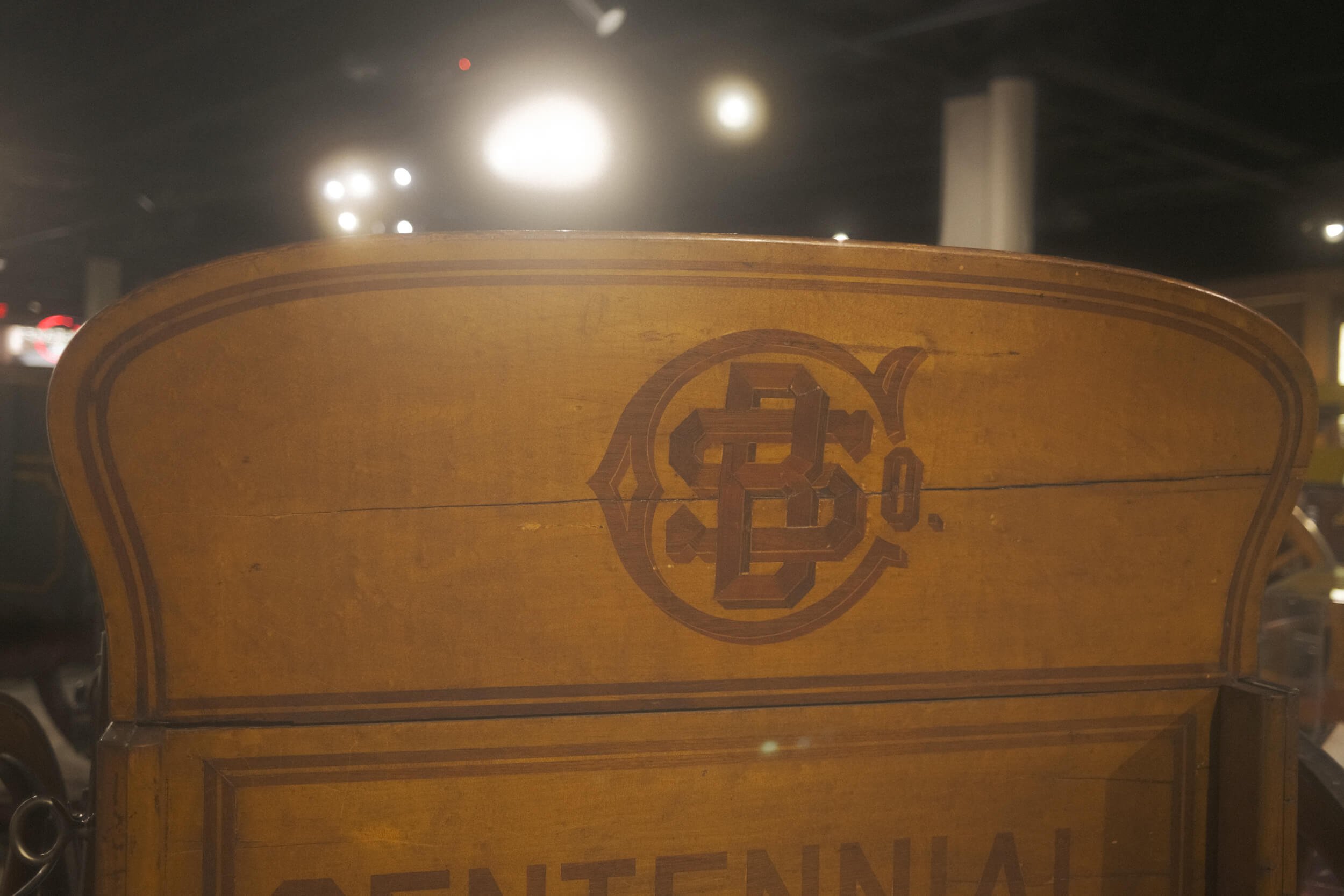A Studebaker Christmas
The moment I walked into my new office’s Christmas party, at the Studebaker Museum on Chapin, I wanted to leave immediately. I was unsure why I had decided to go in the first place: the fog of loneliness that had enveloped me upon my arrival in South Bend had never once been lifted by spending time around my coworkers, and there was no indication that the party would be uncanny in the slightest in this regard—or in any other.
My coworkers had so often mentioned “Studebaker” since my arrival in town that I couldn’t help to be aware that it had once existed, and that its vanishing had left scars on the skin of the city and on the psyches of its inhabitants. As to when or why this had happened, I had no idea. Nor had I been to the museum towards which I walked that cold night, passing Washington’s grand, fading homes, lit trees blinking in the windows. When I turned on Chapin to walk beneath the banners flapping on lampposts, I caught sight of the museum’s lights from the street and hurried towards it.
“You made it!” said one of the avuncular managers I had met on my first day as I pushed in the door. I hadn’t spoken to the man since and decided he must have been exclaiming the same to everyone who entered whether he recognized them or not. A whole crowd of people was mingling in a long, narrow lobby that was brightly lit and decorated with wreathes and garland. The “Information” sign that hung over a desk had been papered over to read “Bar.” I made my way to it, scanning the room for those I especially needed to avoid—Martin from marketing, who was insistent on my joining the bowling league, and Pauline from accounting, whose query I had been ignoring all week. The bartender obliged me with a generous gin to tonic ratio, and I slipped a slightly less generous bill into the tip jar.
The glass was cold, but I was still beginning to sweat under my coat. I couldn’t get to the coatroom because my supervisor was standing right next to it, gesticulating wildly, the contents of his drink threatening to take flight with each punctuated word. To my right I saw into the first-floor gallery, which I thought might offer a respite. I slipped through the crowd with my head down, whispering apologies even though no one needed to clear a path for me. Inside the exhibit, I took a breath. It was less crowded within, yet still I recognized colleagues milling about, looking closely at the cars on display, reading closely placards and labels, and wall displays with old photos and newspaper clippings. I almost continued further, but ahead of me I saw Martin and Pauline deep in conversation, and I spun around before they could catch sight of me.
Back in the lobby, I scanned the room again, now nearly desperate. This time, I looked up and saw a second floor ringing the lower level. A man I didn’t recognize was leaning on the level’s railing and looking down at the party below. Before I could see if I were being followed from behind, I took the stairs three at a time. By the time I reached the top, the man was gone. I turned back to look at the figures below, whose talk had turned into unintelligible babble. From that height the party appeared different. What at eye-level seemed to be random arrangements from above were orderly: people grouped near the coatroom, the bar, and the gallery exit. Those standing alone scoured the room for someone else to talk to. Heads that showed no signs of balding below revealed their secrets from above. I pulled myself away before I was caught.
To my left the second-floor gallery opened up. From within I saw gleams of color flashing off fenders. It appeared deserted, and so I walked in, barely looking at the cars as I wove my way down the path between them. I stopped at the back of the room. The sounds of the party were gone. Between the lights lining the floor hitting the cars in sharp relief from below and the neon signs that rimmed the room coloring them from above, I felt I had entered a trick mirror, one in which I remained myself but all around me the world was transformed. When a moment had passed and my eyes adjusted to the candy colors, I saw that there was a man seated in front of me on a diner stool. The diner stools were lined up against a diner counter, which was red and white and made up to look like a place from the 1950s. Behind the counter a floor-to-ceiling mirror reflected the gallery right back, making it seem as though the room went on for another forty yards, a whole other set of paths and displays. The man had been staring straight ahead, but when I looked at him he turned his head.
“Oh, hello,” he said. He had olive skin, drooping jowls, a small dimple in his chin, and thick, heavily greying hair. He was turning a cigarette lighter over and over in his hand.
“Are you hiding from the party too?” I asked him, after returning his greeting.
“Is there a party?” he said, making a tepid effort to peer over my shoulder in the door’s direction. “No, no. I’m not at it,” he continued. “I just like to sit here a while before I go home for the evening. I used to work for the company, and now they keep me around as a hand at the museum.”
He seemed too young to have worked at a place that vanished long ago, but maybe Studebaker had not been gone so long as I thought. “What did you do?” I asked him.
“I did my best,” he said softly, not answering my question directly. “I was given a ship with holes in the hull. That was our only hope of plugging it up.” He pointed behind me at a sports car. It sat so low to the ground that its front fender nearly scraped the floor. Its front headlights were set in perfectly round, eye-like slots, and the whole effect was of something vaguely familiar that I was sure I’d never seen before. I didn’t know what to say. But the man continued without prompting. “If they had just left with a little more in the reserves, or done what we had to do decades before. Did you know they still had dirt floors in parts of the shop into the 60s? And then there were PH’s famous friendly labor relations.” He hurumphed. “A lot of good they did the workers in the end.” I was having trouble following his line of thought, and when I realized that he was no longer even looking at me as he spoke, I sidled away, keeping my eyes on him in case he turned his head to follow me as I left the diner counter.
He didn’t. But as I turned my head, I found myself almost colliding with another man. “Oh, excuse me!” I exclaimed.
“That’s quite all right,” he said. “You were trying to get away from Sherwood, I imagine?”
I nodded. “Do you know him?” I asked. “Do you work here too?” The man laughed abruptly.
“Work here! Is that what Sherwood said he does? Sherwood hasn’t worked for anything Studebaker since he the cancer come back in ‘63. He hasn’t even been alive since ‘69. He doesn’t work here. He just can’t let it go. He sits at that diner all day, mulling over that damned Avanti and blaming me.” I blinked a few times in rapid succession. I thought I heard him say that the other man—whom he called Sherwood—had died in 1969. The drink must have been hitting me afresh, I was sure. I focused back on the man in front of me. He was tall and handsome in an old Hollywood way, and was wearing a fedora placed just so on his head. I wondered where he was going, or where he had been.
“Of course he’s not the only one who blames me,” the man went on. “They all hassle me for leaving to go to Europe in ’48, and for that old slogan ‘America’s Friendliest Factory.’” He, too, by this point appeared to be recounting a rehearsed speech to himself rather than conversing with me. “Why is it such a crime to pay people a decent wage without making them strike for it? Why is it such an indictable offense to go serve your country? Don’t blame me—blame that terrible ’53,” he said, jerking a finger to the car over his shoulder. “Blame Ford’s and Chrysler. Or blame Albert! It was Albert who put us in the receivership in the first place, paying out dividends and building cars in ’33 like it was 1925.” The man pointing another finger accusingly at a figure in the corner, whom I hadn’t noticed. “Albert put us in receivership and then shot himself when he was fired. His personals were as bad as the company’s.”
The man was still talking. But I couldn’t take it anymore. My head really was spinning. The neon signs on the walls seemed to wink at me in rhythm, and I was feeling more and more detached from my body, as if it were moving and I were being tugged behind it by a rope. I walked past the man still speaking. He took no notice of me. I went up close to “Albert” in the corner. He was pacing quickly in a small circle and studying an old issue of the Tribune close to his face, and muttering to himself. “STUDEBAKER IN RECEIVERSHIP” the paper read at the top. The date was March 19th, 1933.
“Hello,” I said to him. He didn’t look up. “Hello!” I said a little louder, moving closer to him. I saw the breast of his suit jacket smoking from a small hole. This time the man looked up and stared right at me. But his eyes did not meet mine. They seemed to go right through me. He looked back down at his paper, pushing his rimless moon glasses back up his nose. I was close enough to make out some of his murmurings.
“Down again, down again, that can’t be right,” he said. He was flipping furiously from the front page to the stock listings, scanning them up and down, and then returning to scanning the headlines and starting the procedure all over again. I stood and took it in for another moment. Then I backed away quickly and looked for the exit, fed up with their mystery, ready to return to the party that had previously left me with such dread. But as I passed an old wooden wagon painted with a red cross, yet another man called out to me. I must have walked right past him without noticing, and he wasn’t going to let me pass the other way without stopping. The man was old, much older than the other three, and seemed to have come from a different age altogether. He had a long grey beard, steely eyes, and a high-collared black overcoat tied tightly beneath his chin.
“Albert wouldn’t speak to you either,” said the man by way of hello. “Don’t take it personally. He won’t speak to anyone. All he does is look at that paper, day after day. He thinks the slide has to end sometime. But he never gave himself enough time to see it.” I had lost all inhibitions and incredulity. What were these men doing here? Why did they keep speaking to me? Why wouldn’t they leave?
“Why are you here?” I demanded of the old man. “Why won’t you go home?”
The old man looked sadly at me. “There’s nothing that can be done,” he said. “Albert won’t speak to me. He can’t bear to tell me that he lost the company when he promised me it would never leave South Bend. He doesn’t listen to me when I tell him it’s all right, when I take my share of the blame for keeping them from going wholly into the gasoline market. I wouldn’t give up on these wagons,” he slapped the wooden seat beside him. “And I still won’t. But the company needed to. So Albert blames me and blames himself more. Hoffman blames himself for leaving, and Albert for spending all that money on dividends. And Sherwood blames Hoffman for never giving him a chance, and he blames himself for not making that Avanti sell. We can’t leave here like this.” The old man stopped talking. He had said what he could say.
Even though I was closer to the door and the party below, still the room was silent. I took them all in at once: the old man sitting stock upright on the wagon seat, Sherwood at the diner counter, PH standing idly nearby, and Albert in the corner, still muttering to himself and fussing with the newspaper. It rustled and cracked as his turned back and forth from front page to financials. In the quiet the crinkling sounded as if it echoed from the walls, each echo building on the last and growing louder the longer I stood there and stared. I had never thought paper would make me so angry. But watching this tableau, seeing each of the men frozen in place, unable or unwilling to do anything, began to drive me wild. As I stood there watching, I worked myself into a near frenzy, until I could keep still no longer.
Without thinking of what I was doing, I rushed over to Albert and seized the paper from his hands. Before he could react, I started tearing it. Shreds fell to the ground and accumulated around my feet like snow. Again and again I tore the paper in my hands. The name went from “STUDEBAKER IN RECEIVERSHIP” to “STU ER REC IP” to “S K P,” until the pieces in my hand were too small to hold and then I threw those to the ground too. He froze, staring not at me but at the floor and the pile of paper that he had just a moment earlier had consumed him.
I heard movement around the room. Sherwood had raised himself from the diner stool and was coming towards us. The old man, with surprising spring, leapt down from his wagon perch and was doing the same. PH was there first. He too stared for a moment at the papers on the floor. The other two were there in a moment, all looking at the floor. None of them paid me any attention. Then, wordlessly, they acted in unison. The old man unfastened his overcoat and shrugged it off his back. He pulled it around Albert and affixed it in the front, covering up his chest and its hole. PH put a great arm around Albert’s shoulders and held him upright as it. And Sherwood, lighter still in hand, reached into his suit and retrieved a cigarette. He flicked a flame to its tip and then handed it to Albert, who took it without moving his head. I was no longer angry. But I had the feeling I was no longer welcome.
I walked back the way I’d came. With each step the party’s sounds were more audible. At the door, I turned to look at what I’d left. The men were standing near Albert’s corner, but they had moved from the pile of torn paper and seemed to be talking to each other. PH’s arm was still around Albert’s shoulders. For a long moment I watched the four men. Then I looked away and descended the stairs without hesitation, returning to what I had been so intent on fleeing.


